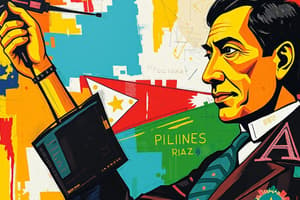Podcast
Questions and Answers
What did Rizal first learn about in Binan, Laguna?
What did Rizal first learn about in Binan, Laguna?
- Mathematics
- History
- Catholicism (correct)
- Science
At what age was Rizal sent to study at the Ateneo Municipal de Manila?
At what age was Rizal sent to study at the Ateneo Municipal de Manila?
- Sixteen (correct)
- Fourteen
- Fifteen
- Seventeen
What did Rizal initially advocate for regarding the Philippines and Spain?
What did Rizal initially advocate for regarding the Philippines and Spain?
- Complete Philippine independence
- Colonial separation from Spain
- Integration of the Philippines within Spain (correct)
- Integration of Spain within the Philippines
What did Rizal focus on promoting instead of revolution?
What did Rizal focus on promoting instead of revolution?
What did Rizal's works 'The Reign of Greed' and 'The Social Cancer' aim to expose?
What did Rizal's works 'The Reign of Greed' and 'The Social Cancer' aim to expose?
What was the role of Francisco Mercado, José Rizal's father, in the Calamba community?
What was the role of Francisco Mercado, José Rizal's father, in the Calamba community?
What different heritages did José Rizal's family possess?
What different heritages did José Rizal's family possess?
How many siblings did José Rizal have?
How many siblings did José Rizal have?
Which tutor played a significant role in José Rizal's early education?
Which tutor played a significant role in José Rizal's early education?
What social class did José Rizal's family belong to in Calamba?
What social class did José Rizal's family belong to in Calamba?
Flashcards are hidden until you start studying
Study Notes
José Rizal: The Life and Journey of a Philippine Nationalist Hero
José Rizal, born on June 19, 1861, in Calamba, Laguna, was the seventh child of Francisco Mercado and Teodora Alonso. Known as the Philippines' national hero, Rizal's life was defined by his commitment to education and his unwavering belief in Filipino nationalism.
Childhood and Family Background
Rizal's family was well-off and influential, belonging to the principalia class or ruling elite of Calamba. His father, Francisco Mercado, was a respected man in their community, serving as the cabeza de barrio or head of town. He was part Chinese, having descended from Domingo Lamco, a full-blooded Chinese entrepreneur who adopted the surname Mercado. The family was multi-racial, with Spanish, Chinese, Japanese, and Filipino heritage. Despite the wealth, they faced struggles against the Spanish colonial authorities due to their perceived threat to Spanish rule. Rizal had nine sisters and one brother named Paciano, who played a significant role in his political activism later in life.
Education and Early Learning
From an early age, Rizal's parents recognized the importance of education despite their own challenges under Spanish colonial rule. They made sure that he received quality education. As he grew older, private tutors were hired to give him lessons at home in preparation for formal schooling. One such tutor was Leon Monroy, who continued teaching him until he joined formal schools.
In Binan, Laguna, Rizal first learned about Catholicism and developed his intellectual curiosity and love for literature. At the age of sixteen, he was sent to study at the Ateneo Municipal de Manila, where he honed his linguistic abilities and excelled academically. Despite facing discrimination and harassment from Spanish students and teachers, he became the president of the school's literary club and began writing poems, sketches, and plays.
Nationalism and Early Activism
Rizal's experiences during childhood and education fostered his strong sense of nationalism. He advocated for social reform and equality among Filipinos and Spaniards. Despite his opposition to Spanish rule, Rizal did not advocate for independence initially. Instead, he focused on promoting integration of the Philippines within Spain, representation in the Cortes, replacement of Spanish friars with Filipino priests, freedom of assembly and expression, and equal rights before the law.
Rizal's works, such as "The Reign of Greed" and "The Social Cancer," passionately exposed the evils of Spanish rule in the Philippines, shaping public opinion towards the need for change. His political program aimed at peaceful reform rather than revolution, reflecting his commitment to nonviolence.
Conclusion
José Rizal's life, childhood, and education played a pivotal role in shaping him into the revered Philippine nationalist hero known for his dedication to education and Filipino nationalism. His journey serves as an inspiration to the pursuit of truth and justice, demonstrating the power of education in driving societal transformation.
Studying That Suits You
Use AI to generate personalized quizzes and flashcards to suit your learning preferences.




